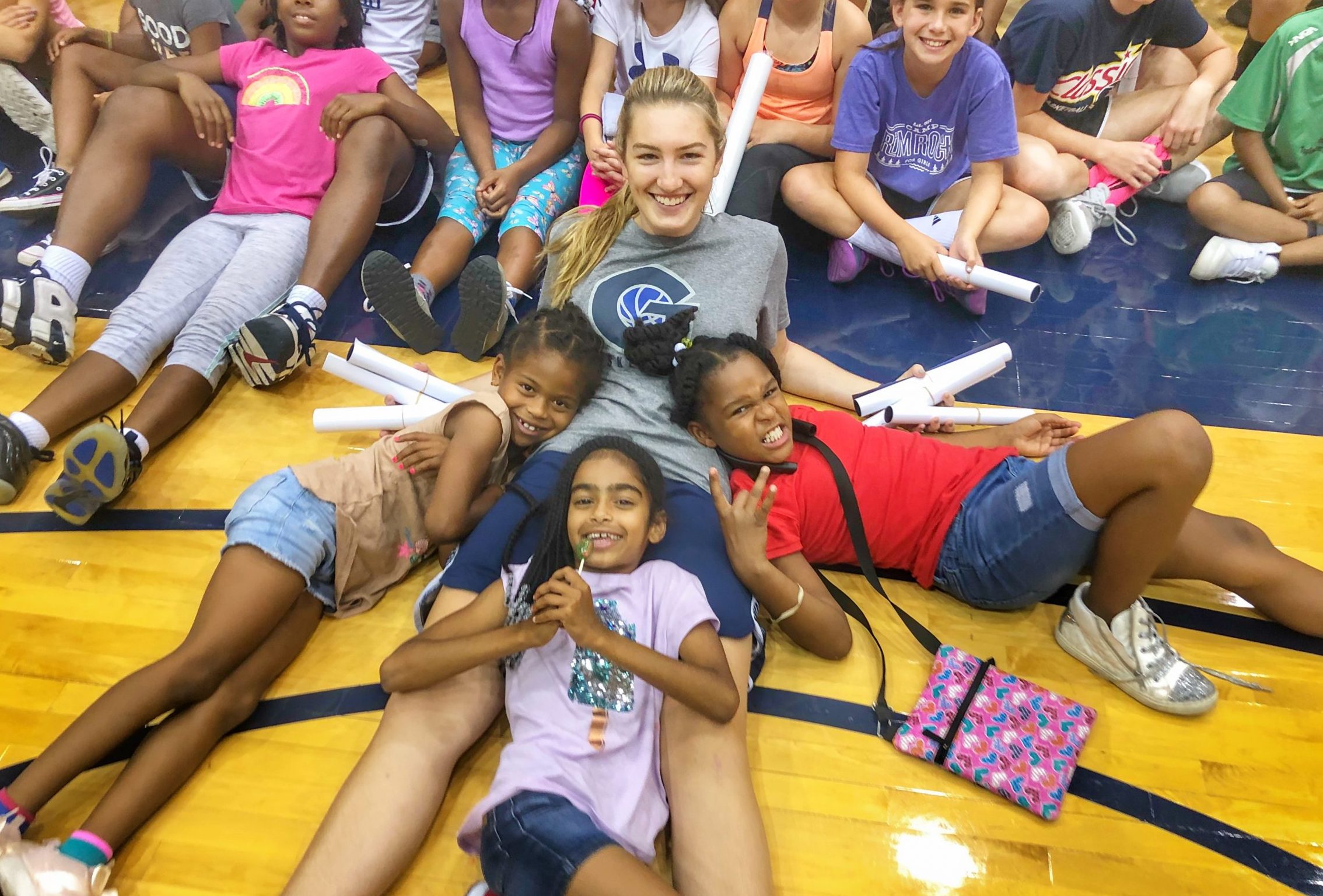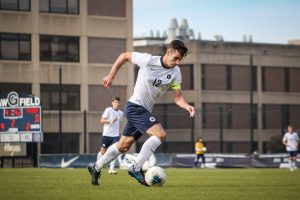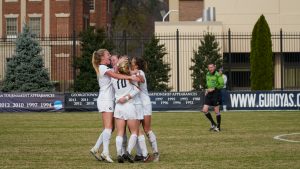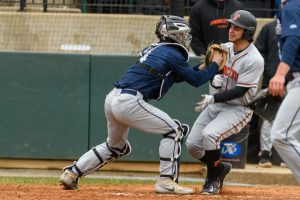The Georgetown women’s basketball team has built a tradition of serving the community, and its basketball camp gives the team a chance to continue reaching out. Over three days during the summer, the coaching staff and players teach the fundamentals of basketball to girls between the ages of 8 and 17 at the Lady Hoyas youth basketball day camp. This year, though, the team has made changes to make the camp more accessible.
In the past, the $200 registration fee had made the camp inaccessible to underprivileged members of the D.C. community. A member of Georgetown’s coaching staff approached Jimmy Lynn, an adjunct professor who mentors Georgetown’s student-athletes, with a potential solution.
“Three years ago, one of the assistant coaches reached out to me and said, ‘We’re having the Lady Hoyas basketball camp this summer. There’s 30 girls from underprivileged, low-income families that want to attend, but they don’t have money. Can you help find a sponsor to pay for it?’” Lynn said. So, Lynn posted on Facebook looking for sponsors. “I was hoping we’d have enough money so maybe six or eight girls we’d be able to send to camp; by the end of that first day, all 30 girls had sponsors.”
That was 2016. The camp was cancelled in 2017, when former head coach Natasha Adair left Georgetown to coach at Delaware, but current head coach James Howard renewed the program in 2018 with the goal of reaching even more girls in the community. This year, 50 girls had sponsors to attend the camp.
The team works on a variety of service projects, such as volunteering in soup kitchens, visiting women’s shelters, and participating in walks for sickle cell disease and breast cancer. But the Lady Hoyas camp is unique in that the players develop a more intimate bond with the community members they serve.
“When one of those kids that we directly helped comes to camp to say thank you, it makes it more human, it makes it more personal,” Adair said. “Our players got to connect with them on a one-on-one basis, almost in a big sister type role.”
And the players dove in head first, with each player leading her own station of the camp based on her basketball strengths.
“The players are hands-on when we have camps,” Adair said. “You would see [senior guard] Dionna White teaching dribbling at the time. You would see, when I was there, Faith Woodard [COL ’17] teaching rebounding, and DiDi Burton [COL ’18], who just graduated and is now on staff as a graduate assistant, she would teach defense.”
More important are the connections the team made with the campers off the floor. They accompanied the girls to lunch at Leo’s and talked with them during breaks in practice.
“It was great. It’s always good giving back to the little kids,” said graduate student guard Dorothy Adomako. “We enjoy when they come to our camps, so it’s always nice.”
Members of the team with different levels of experience in their Georgetown careers took part this year, from veterans like Adomako and junior guard Morgan Smith to transfers from other schools who have yet to play a minute on the court for the Hoyas, like junior forward Anita Kelava (Maine) and senior guard Brianna Jones (Louisville). Even players who had yet to start their college careers, such as freshmen guards Courtney Meadows and Tayanna Jones, among others, were involved in coaching the campers.
“It’s been a hit because our young women are able to reach out to [the campers], and they connect,” Howard said. “And it’s connecting the community with our players, and that’s the way we want to be able to do it.”
Lynn himself received guidance from mentor Ted Leonsis (COL ’77), the CEO of Monumental Sports & Entertainment, when the two worked together at AOL. For Lynn, the best way to repay a mentor is to pay it forward. It’s what he’s done for the student-athletes at Georgetown, and he encourages them to mentor the generation after that.
“For me, it’s taking these women basketball players, including a bunch of freshmen, [and] trying to teach them at a young age how important it is to give back,” Lynn said.
Lynn is also on the board of the Washington Nationals Youth Baseball Academy. The academy gives kids from underserved neighborhoods in D.C. a place to spend time after school and during the summers to further their educations and participate in sports like baseball and softball. Ten of the 50 girls who had sponsors for the 2018 basketball day camp came from the program. Howard said that when Lynn goes to the academy, the girls remember Georgetown’s camp and ask about the team.
“They’re asking about our players,” said Howard. “And they know our players by name just because of the interaction they had this summer with them, and, ‘Mr. Jimmy, when are we going for a game? When are we going to Georgetown? When are we going to see Brianna? And when are we going to see Tayanna?’ You know, that’s the special part of what we’re doing.”
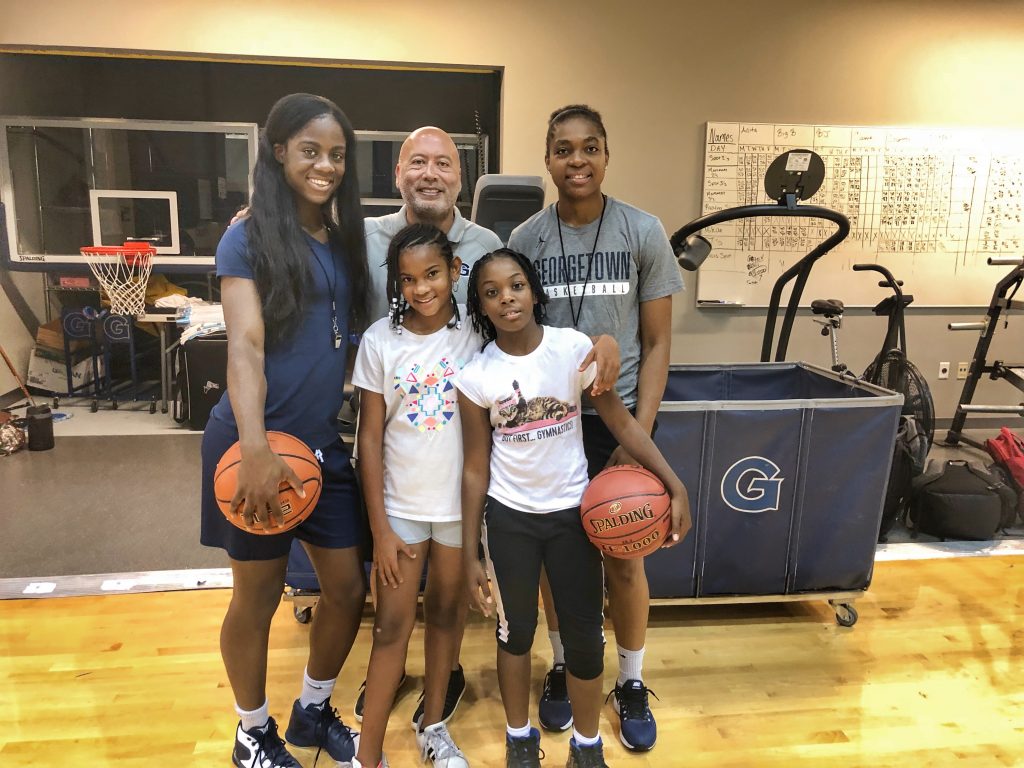
For the kids, this went beyond just a basketball camp. They all learned skills on the court, but the memories are going to be from the moments off the court with the team. It’s easy to see how special these interactions were.
“Courtney is a freshman, there’s like six girls on her lap,” Lynn said. “They love Morgan, Anita was terrific, I mean across the board. Dorothy can be a little shy; [she] had two girls up in her arms.”
However valuable these memories are, the camps are about more than just spending time with college athletes. Lynn hopes that exposing the girls to a college atmosphere will give them the idea that college is indeed attainable for them. To emphasize this point, he makes sure the girls have an hour outside of the gym to visit the McDonough School of Business and meet Dean Patricia Grant.
“Dean Grant’s African-American [and a] first-generation college graduate,” Lynn said. “I wanted the little girls to see that there’s someone else that looks like them, and she’s like the principal of this building.”
Lynn hopes to expand the program even further and bring a group of women’s basketball players to the academy once a month. As more kids earn sponsorships to come to Georgetown’s camp, they’ll continue to be exposed to college players and a college coaching staff, with college emphasized as an attainable end goal. Adair sees coaches as “invested in the youth for tomorrow,” and it’s for this reason that Adair hopes the program continues to grow.
“It went from 30 to 50, and then let’s just keep growing it. Let’s grow it by 20, if not more. I’m looking to see it grow this year as a fan and as a supporter, still,” she said. “Let’s go 70, let’s go 80, let’s see if we can hit that 100 mark of people supporting players that want to come to camp.”
The camp has an effect on the Georgetown team as a reminder of their own backgrounds and struggles in getting to where they are, and there lies the root of the team’s service tradition. As the team reflects on what they’ve been given, Howard emphasizes to his locker room that they have to give more.
“We talk about it every day, we can’t fall on all the great things that have been given, we also have to give back,” Howard said. “I think they gave us some hope, as well. And know that, hey, you can do anything, no matter where you’re from or what you have.”


